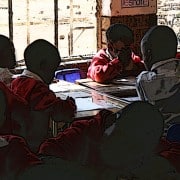|
Getting your Trinity Audio player ready...
|
 Corruption Watch has teamed up with the YFM morning Flava team every Friday at 8:30 to reach out to South Africa’s youngsters and get them involved in the fight against corruption.
Corruption Watch has teamed up with the YFM morning Flava team every Friday at 8:30 to reach out to South Africa’s youngsters and get them involved in the fight against corruption.
Central to this “No more tjo-tjo” feature will be urging young listeners to reject bribery in all forms and encouraging them to sign Corruption Watch’s online pledge to make their voices heard.
The Friday radio slot will also see Corruption Watch sharing further ideas on how young people can become active participants in the fight against corruption.
“Complaining about what’s wrong is not enough. What can you do to stop corruption from robbing you of your future? This is the question and challenge we are posing to you. As youth, you are being affected right now. Where will your children be in 30 or 40 years’ time, if this trend continues?” asks the organisation’s Ella Scheepers, who features on the show.
Here are a few simple steps that anti-corruption activists can take:
• First, refuse to be part of the problem. Sign the pledge! Refuse to accept or offer a bribe. This is a principled decision.
• Second, talk about and activate these issues within your community and the affects they have, and how you can be empowered to prevent them. We are not voiceless.
• Thirdly, report corruption to us. Tell us exactly where it is happening, who is involved, and help us with evidence, if possible, so that we can build campaigns around certain issues. We can also publish your stories on our social media platforms and website. The louder we speak as a united voice, the better the chance of being heard.
Why the focus on youngsters?
The Corruption Watch pledge commits signatories to be responsible and honest citizens, to treat public resources respectfully and to act with integrity. The pledge gives concrete expression to a positive, progressive ethos and recognises the need for a widespread response to combat the problem of corruption in South Africa. The organisation sees youth as important partners in this social movement.
Young people are understandably the most affected by corruption. There are already disturbing indicators that this group is falling into the trap of believing that corruption provides an easy way out of difficult situations.
A Transparency International survey conducted in Vietnam has found that a significant proportion of Vietnamese youths were willing to cheat or engage in corruption if it would benefit them financially.
Some 37% were willing to be dishonest in order to get into a good school, and 32% would agree to engage in corrupt practices to be selected for a desirable job.
Transparency International goes further to report that that young people under the age of 30, all over the world, are more likely to give a bribe than older people.
A staggering 88.1% of South African youth believe that corruption is holding the country back. This is according to a survey conducted by mobile research firm, Pondering Panda, on Africa’s biggest social network, Mxit.
Pondering Panda gathered responses from 6 121 individuals over a six-day period, the majority of whom were below the age of 35.
The survey revealed that irrespective of race or age, South Africans see corruption as a disease from which no one is immune. Perhaps one of the most alarming findings from the survey was that 42.53% of local youth felt that corruption was most evident in government, in contrast to just 4.22% in business. Furthermore, 38.57% of South Africa laid the blame for corruption on the governing ANC.
This is a challenge for us to think deeper about the ethos passed on to the next generation of public and private sector leaders. It is important to stop the corrosion spreading to the youth and Corruption Watch will be reaching out over the coming months to other institutions, where young people are present, to engage and educate them about corruption and its consequences.
The pledge provides a good platform to initiate discussions around ethical leadership, active citizenry and activism. It also aims to build an “army”, so that we become active participants in fighting corruption, rather than passive victims.
Tune into YFM’s Flava show every Friday at 8.30am and get activated!
How corruption affects SA’s youth
- Paying for driver licenses and ID books
- Paying police, prosecutors and judges to throw out cases
- Slum lords pay police to ignore drug and other illegal activities
- Doctors bribed to help certain clients
- Teacher paid, in cash or favours, by student to give them better marks
- Teacher gives one student better marks because parent is his/her friend
- Textbooks not reaching schools on time – if at all
- School leaders like captains and prefects abusing their power








